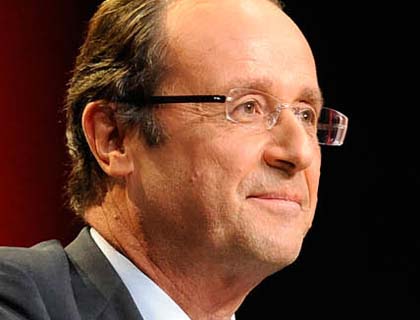PARIS - France's president-elect Francois Hollande was plunged straight into the European economic debate on Monday, as doubts over his plans and turmoil in Greece threatened to tip the eurozone back into crisis.
The 57-year-old Socialist won power on Sunday, ousting right-wing leader Nicolas Sarkozy, and is due to take office formally on May 15 before embarking on a packed calendar of major international summits.
First on his agenda will be Europe's debt crisis, where he is on a collision course with fellow EU leaders over his plan to renegotiate the bloc's fiscal pact which many credit with saving the eurozone from meltdown.
Hollande promised the cheering crowds that welcomed his election that he would reopen talks in order that the pact focus on growth rather than simply imposing deficit-cutting austerity rules, an idea opposed by Berlin.
"This is the mission that is now mine: to give the European project a dimension of growth, employment, prosperity -- in short, a future," he said.
"This is what I will say as soon as possible to our European partners and first of all to Germany," he declared. "We are not just any country on the planet, just any nation in the world, we are France."
Germany is France's traditional partner in Europe, but Chancellor Angela Merkel's government warned once again that reopening talks on the pact -- endorsed by 25 of 27 EU governments in March -- would be impossible.
Berlin offered to discuss a separate deal on growth, but Merkel's spokesman Steffen Seibert said: "It is not possible to renegotiate the fiscal pact."
Merkel nevertheless said she would welcome Hollande to Berlin next week "with open arms" and said they had agreed during a telephone call on Sunday to work "well and intensively" together.
Hollande's campaign director Pierre Moscovici confirmed that Merkel had been the first head of government in contact with the new French leader after his win and that Berlin would be his first visit after inauguration.
Ireland's Deputy Prime Minister Eamon Gilmore meanwhile warned that his country would not defer a May 31 referendum on the fiscal pact to give Hollande time to rework the treaty.
The uncertainty generated by Hollande's election and the political turmoil in Greece, where election gains by hard-left and extreme-right parties stripped the ruling coalition of its majority, perturbed the markets.
Stocks tumbled in Asia and opened down sharply in France before recovering, the euro took a new battering and the spread in yields between French and German bonds widened, as markets eyed developments in the eurozone warily.
Japan's Finance Minister Jun Azumi said the election results in France and Greece could have a "destabilizing" effect on the markets, as he warned traders against speculative currency moves.
Traders said there were concerns that victories for Hollande in France and for opposition parties in Greece marked the start of a backlash against austerity measures designed to slash eurozone public deficits.
The single currency dropped to $1.2998, down from $1.3082 on Friday in New York, while in Tokyo stocks closed 2.78 percent lower, Sydney finished 2.15 percent down while Hong Kong ended 2.61 percent off.
The Paris CAC 40 opened 1.57 percent lower, but recovered to gain 1.06 percent by the afternoon. US stocks also opened slightly weaker.
Despite the concerns, France raised 7.98 billion euros ($9.1 billion) in short-term debt on Monday, with lower interest rates paid to investors for two of the three maturities offered.
Hollande plans to replace some of Sarkozy's cost-cutting with higher taxes on the wealthy while balancing the French budget by 2017, despite a hiring spree in education and a return to retirement at 60 for some workers.
After seeing Merkel shortly after his inauguration Hollande will attend several international meetings, including a G8 summit in the United States on May 18 and 19 and a NATO gathering in Chicago on May 20 and 21.
Hollande's communications director Manuel Valls confirmed Monday that France would use the summit to "announce the withdrawal of its forces from Afghanistan between now and the end of the year."
US President Barack Obama invited Hollande for talks at the White House, amid concerns about this pledge to hasten the exit of France's 3,300-strong contingent from the NATO-led force in Afghanistan.
And a spokeswoman for NATO chief Anders Fogh Rasmussen said any decision on an early French pull-out would have to be agreed with the other allies at the Chicago summit in May.
Defense officials in Kabul doubted this was even feasible, but Afghan commanders insisted they were ready to take responsibility for their own fate.
China's President Hu Jintao also sent a message of congratulation to Hollande, promising to work with him.
Hollande will have to complete the task of casting his new government in the coming days, before his party sets off on the campaign trail for France's June parliamentary election, when he will hope to secure a ruling majority.
Sarkozy, still only 57, congratulated Hollande on the win and signalled that he intends to step back from frontline politics.
Official final results of Sunday's second round run-off showed that Hollande had won 51.62 percent of the vote to Sarkozy's 48.38. (AFP)

